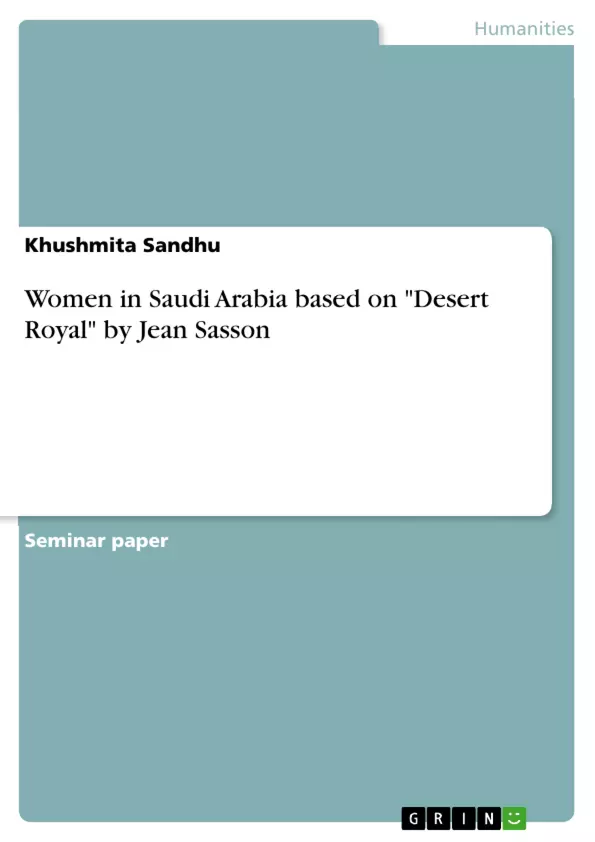The present term paper will try to compile the life and atrocities suffered by Saudi women, royals and commoners - the patriarchal society of Saudi Arabia, as well as the recent developments in Saudi Arabia with regard to women, both by taking references from the novels written by Jean Sasson as well as from the web sources.
Princess - A trilogy, which is written by international author Jean Sasson, is a heart stirring novel about the life of a Saudi Princess Sultana, which is testimony to a woman of indomitable spirit and great courage.
In this trilogy, Jean Sasson captured the flavours and reality of life in a country full of extremes and contradictions. Princess ‘Sultana’, a real Saudi princess closely related to king, lives those contradictions, with priceless jewels, many servants, unlimited funds at her disposal, but NO FREEDOM. Jean Sasson quotes princess ‘Sultana’ as, “A prisoner in a gilded cage with no vote, no control, and no value but as a mother of son, she is totally at mercy of the men of her life- her father, her brother, her husband’. In this novel, this bold Saudi princess gave an unvarnished look inside a closed society. ‘Sultana’ lifted the veil on the shocking world of forced marriages, sex slavery, honour killings and other outrages against women, both royal and common.
By telling her story and miserable life of women in kingdom, ‘Sultana’ risked the wrath of the Saudi people and for this reason, she told her story anonymously through the bestselling author.
This never forgetting real life story inspired me to write a term paper regarding society of Saudi Arabia, whose shimmers fade, when it comes to life of women
Inhaltsverzeichnis (Table of Contents)
- INTRODUCTION
- Saudi Arabia- a brief history
- RULERS OF THE KINGDOM OF SAUDI ARABIA
Zielsetzung und Themenschwerpunkte (Objectives and Key Themes)
This term paper aims to explore the life and experiences of Saudi women, both royal and common, focusing on the patriarchal society of Saudi Arabia and recent developments regarding women. It draws on the novels of Jean Sasson and web resources.
- The life of a Saudi princess and the constraints she faces within a patriarchal society
- The impact of traditional practices such as forced marriages, sex slavery, and honour killings on Saudi women
- The contrast between the opulent lifestyle and the lack of freedom experienced by royal women in Saudi Arabia
- The historical context and rise of the Al'Saud clan, the ruling family of Saudi Arabia
- The influence of oil wealth and the challenges faced by women within a seemingly wealthy nation
Zusammenfassung der Kapitel (Chapter Summaries)
- The introduction provides a brief overview of the topic, highlighting the use of Jean Sasson's novels as a source of information about Saudi women's experiences. It introduces the central character, Princess Sultana, and her journey to tell her story.
- The chapter titled "Saudi Arabia- a brief history" provides a historical overview of the kingdom, focusing on the rise of the Al'Saud clan and their rule since the early 20th century. It discusses the role of Abdul Aziz, the first king of Saudi Arabia, in consolidating power and shaping the nation.
Schlüsselwörter (Keywords)
This term paper focuses on the themes of gender inequality, patriarchal society, women's rights, Saudi Arabia, royal family, Al'Saud clan, forced marriages, sex slavery, honour killings, oil wealth, and the contrast between luxury and restrictions.
Frequently Asked Questions
What is the focus of Jean Sasson's "Princess" trilogy?
The trilogy tells the true life story of a Saudi princess named Sultana, exposing the atrocities and lack of freedom faced by women in Saudi Arabia's patriarchal society.
What are some of the outrages against women mentioned in the book?
The novel highlights forced marriages, sex slavery, honor killings, and the total lack of legal control women have over their own lives.
Why is Princess Sultana's life described as a "gilded cage"?
Despite having unlimited funds, jewels, and servants, she has no vote, no freedom, and is entirely at the mercy of the men in her family (father, brother, husband).
Who is the ruling family of Saudi Arabia?
The Al'Saud clan is the ruling family. The kingdom was consolidated by King Abdul Aziz in the early 20th century.
Why did Princess Sultana tell her story anonymously?
By exposing the inner workings of the closed Saudi society, she risked the wrath of the Saudi people and the government, necessitating anonymity for her safety.
Does the paper discuss recent developments for women in Saudi Arabia?
Yes, the term paper compile both historical atrocities and recent developments regarding women's rights and status in the kingdom.
- Citar trabajo
- Khushmita Sandhu (Autor), 2014, Women in Saudi Arabia based on "Desert Royal" by Jean Sasson, Múnich, GRIN Verlag, https://www.grin.com/document/282763



